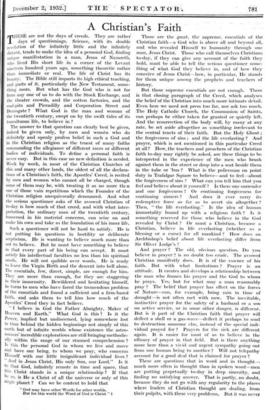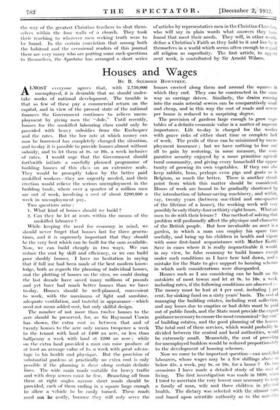A Christian's Faith
THESE are not the days of creeds. They are rather days of questionings. Science, with its double revelation of the infinitely little and the infinitely distant, tends to make the idea of a personal God, finding unique manifestation in a man, Jesus of Nazareth, who lived His short life in a corner of the Levant nineteen hundred years ago, something theoretic rather than immediate or real. The life of Christ has its beauty. The Bible still imparts its high ethical teaching, and parts of it, particularly the New Testament, some- thing more. But what has the God who is not far from any one of us to do with the Stock Exchange, and the theatre crowds, and the cotton factories, and the coal-pits and Piccadilly and Corporation Street and Deansgate ? What God is the man and woman of the twentieth century, swept on by the swift tides of its tumultuous life, to believe in ?
The answer to that question can clearly best be given, indeed be given only, by men and women who do definitely and openly profess belief in such a God and in the Christian religion as the truest of many faiths commanding the allegiance of different races or different bodies of individuals. To define a personal faith is never easy. But in this case no new definition is needed. Week by week, in most of the Christian Churches of this and many other lands, the oldest of all the declara- tions of a Christian's faith, the Apostles' Creed, is recited by men and momen who cannot all be charged, though some of them may be, with treating it as no more than one of those vain repetitions which the Founder of the Christian religion unequivocally denounced. And what the serious questioner asks of the avowed Christian of to-day is how much of that creed, and with what inter- pretation, the ordinary man of the twentieth century, immersed in his material concerns, can seize on and make his own and take as the foundation of his inner life.
Such a questioner will not be hard to satisfy. He is not putting his questions in hostility or deliberate scepticism. He is wanting to believe much more than not to believe. But he must have something to believe in that every part of his being can accept. It must satisfy his intellectual faculties no less than his spiritual needs. He will not quibble over words. He is ready to leave_the Virgin Birth and the descent into hell alone. The essentials, few, direct, simple, are enough for him. They are more than enough, for they are staggering in their immensity. Bewildered and hesitating himself, he turns to men who have faced the tremendous problem of the essentials and found a sufficient and a firm-based faith, and asks them to tell him how much of the Apostles' Creed they in fact believe.
" I believe in God the Father Almighty, Maker of Heaven and Earth." What God is this ? Is it the Power, implied but undiscerned, lying somewhere lost in time behind the hidden beginnings not simply of this earth but of infinite worlds whose existence the astro- nomers' incredible explorations are still bringing methodic- ally within_ the range of our stunned comprehension ? Is this the personal God in whom we live and move and have our being, to whom we pray, who concerns Himself with our little insignificant individual lives ? " And in Jesus Christ, His only Son, our Lord." Is it to that God, infinitely remote in time and space, that this Christ stands in a unique relationship ? If that be so, is He a Christ of, all the universe or only of this Single planet ? Can we be content to hold that
" God may have other Words for other worlds, But for this world the Word of God is Christ " !
Those are the great, the supreme, essentials of the Christian faith—a God who is above all and beyond all, and who revealed Himself to humanity through one man, Jesus Christ. Those who call themselves Christians to-day, if they can give any account of the faith they hold, must be able to tell the serious questioner some- thing • of what God they believe in, and of how they conceive of Jesus Christ—how, in particular, He stands for them unique among the prophets and teachers of history.
But those supreme essentials are not enough. There is that closing paragraph of the Creed, which analyses the belief of the Christian into much more intimate detail. Even here we need not press too far, nor ask too much. The Holy Catholic Church, the Communion of Saints, can perhaps be either taken for granted or quietly left.. And the resurrection of the body will, by many at any rate, be set aside altogether as something irrelevant to the central tenets of their faith. But the Holy Ghost ; the forgiveness of sins ; and the life everlasting ? And prayer, which is not mentioned in this particular Creed at all ? How,-the teachers and preachers of the Christian- faith to-day may rightly be- asked, are these things to be. interpreted in the experience of the men who brush against them in the street or drop into a seat beside them in the tube or 'bus ? What is the policeman on point duty in Trafalgar Square to believe—and to feel—about the forgiveness of sins ? What can you tell him that you feel and believe about it yourself ? Is there one surrender and one forgiveness ? Or continuing forgiveness for continuing sinners ? And. does it ever carry its redemptive force so far as to avert sin altogether ? Then, " the life everlasting." Is the idea of human immortality bound up with a religious faith ? Is it something reserved for those who believe in the God revealed by Christ ? Or must a Christian, because u Christian, believe in life everlasting (whether as a blessing or a curse) for all mankind ? How does an Archbishop's belief about life everlasting differ from Sir Oliver Lodge's ?
And prayer ? The old, obvious question, Do you believe in prayer ? is no doubt too crude. The avowed Christian manifestly does. It is of the essence of his faith. But with what limitations ? Prayer is an attitude. It creates and develops a relationship between the man who frames his prayer and the God to whom he prays. Yes; but for what may a man reasonably pray ? The belief that prayer has effect on the forces of Nature—can, for example, bring rain in time of drought—is not often met with now. The inevitable, instinctive prayer for the safety of a husband or a son on active service, or in some other danger, is different. But is it part of the Christian faith that prayer will deflect- a shell or a gas-wave—deflect it perhaps to send to destruction someone else, instead of the special indi- vidual prayed for ? Prayers for the sick are different again. It is easier for most of us to believe in the efficacy of prayer in that field, But is there anything more here than a vivid and urgent sympathy going out from one human being to another ? Will not telepathy account for a good deal that is claimed for prayer ?
These are questions that in word and in thought— much more often in thought than in spoken word—men are putting perpetually to-day in deep sincerity, and finding no satisfying answer. That is partly, no doubt, because they do not go with any regularity to the places where leaders of Christian thought are dealing, from their pulpits, with these very problems. But it was never the way of the greatest Christian teachers to shut them- selves within the four walls of a church. They took their teaching to wherever men seeking truth were to be found. In the certain conviction that among both the habitual and the occasional readers of this journal there arc very many who are putting some such questions to themselves, the Spectator has arranged a short series- of articlei by repreSentative men in the Christian Churches., who will Say in plain words what answers they have found that meet their needs. They will, in other words, define a Christian's Faith as they hold to it and live by it themselves in a world which seems often enough to regard all religion as superfluity. The first article, to appar next week, is contributed by Sir Arnold Wilson.











































 Previous page
Previous page